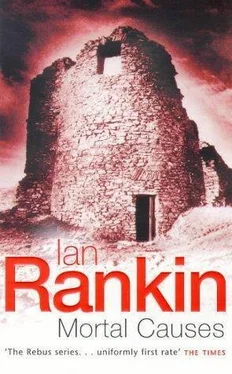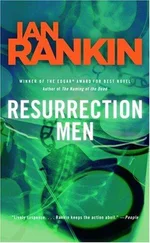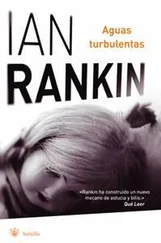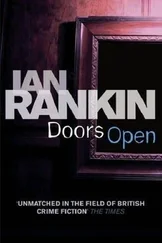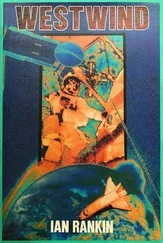Rebus looked in on the five youths. They sported bruised faces, bandaged hands. The blood had dried to a crust on them, and they'd left it there, like war paint, like medals.
'Look,' one of them said to the others, 'it's the bastard who took a poke at Pete.’
'Keep talking,' retorted Rebus, 'and you'll be next.’
'I'm quaking.’
The police had stuck a video camera onto the rioters outside the station. The picture quality was poor, but after a few viewings Rebus made out that one of the stone throwers, face hidden by a football scarf, was wearing an open denim jacket and no shirt.
He stuck around the station a bit longer, then got back in his car and headed for the Gar-B. It didn't look so different. There was glass in the road, sounds of brittle crunching under his tyres. But the local shops were like fortresses: wire mesh, metal screens, padlocks, alarms. The would-be looters had run up and down the main road for a while in a hotwired Ford Cortina, then had launched it at the least protected shop, a place specialising in shoe repairs and keycutting. Inside, the owner's own brand of security, a sleepy-eyed Alsatian, had thrown itself into the fray before being beaten off and chased away. As far as anyone knew, it was still roaming the wide green spaces.
A few of the ground floor flats were having boards hammered into place across their broken windows. Maybe one of them had made the initial call. Rebus didn't blame the caller; he blamed the two officers. No, that wasn't fair. What would he have done if he'd been there? Yes, exactly. And there'd have been more trouble than this if he had…
He didn't bother stopping the car. He'd only be in the way of the other sight-seers and the media. With not much happening on the IRA story, reporters were here in numbers. Plus he knew he wasn't the Gar-B's most popular tourist. Though the constables couldn't swear who'd thrown the ghetto-blaster, they knew the most likely suspect. Rebus had seen the description back at Drylaw. It was Davey Soutar of course, the boy who couldn't afford a shirt. One of the CID men had asked Rebus what his interest was.
'Personal,' he'd said. A few years back, a riot like this would have prompted the permanent closure of the community hall. But these days it was more likely the Council would bung some more cash at the estate, guilt money. Shutting the hall down wouldn't do much good anyway. There were plenty of empty flats on the estate – flats termed 'unlettable'. They were kept boarded up and padlocked, but could soon be opened. Squatters and junkies used them; gangs could use them too. A couple of miles away in different directions, middle class Barnton and Inverleith were getting ready for work. A world away. They only ever took notice of Pilmuir when it exploded.
It wasn't much of a drive to Fettes either, even with the morning bottlenecks starting their day's business. He wondered if he'd be first in the office; that might show too willing. Well, he could check, then nip out to the canteen until everyone started arriving. But when he pushed open the office door, he saw that there was someone in before him. It was Smylie.
'Morning,' Rebus said. Smylie nodded back. He looked tired to Rebus, which was saying something, the amount of sleep Rebus himself had had. He rested against one of the desks and folded his arms. 'Do you know an Inspector called Abernethy?’
'Special Branch,' said Smylie.
'That's him. Is he still around?’
Smylie looked up. 'He went back yesterday, caught an evening plane. Did you want to see him?’
'Not really.’
'There was nothing here for him.’
'No?’
Smylie shook his head. 'We'd know about it if there was. We're the best, we'd've spotted it before him. QED.’
'Quod erat demonstrandum.’
Smylie looked at him. 'You're thinking of Nemo, aren't you? Latin for nobody.’
'I suppose I am.’
Rebus shrugged. 'Nobody seems to think Billy Cunningham knew any Latin.’
Smylie didn't say anything. 'I'm not wanted here, am I?’
'How do you mean?’
'I mean, you don't need me. So why did Kilpatrick bring me in? He must've known it'd cause nothing but aggro.’
`Best ask him yourself.’
'Maybe I will. Meantime, I'll be at St Leonard's.’
'We'll be pining away in your absence.’
'I don't doubt it, Smylie.’
'What does the woman do?’
'Her name's Millie Docherty,' said Siobhan Clarke. 'She works in a computer retailer's.’
'And her boyfriend's a computer consultant. And they shared their fiat with an unemployed postie. An odd mix?’
'Not really, sir.’
'No? Well, maybe not.’
They were in the canteen, facing one another across the small table. Rebus took occasional bites from a damp piece of toast. Siobhan had finished hers.
'What's it like over at Fettes?’ she asked.
'Oh, you know: glamour, danger, intrigue.’
`Much the same as here then?’
'Much the same. I read some of Cafferty's notes last night. I've marked the place, so you can take over.’
'Three's more fun,' said Brian Holmes, dragging over a chair. He'd placed his tray on the table, taking up all the available room. Rebus gave Holmes's fry-up a longing look, knowing it wouldn't square with his.diet. All the same… Sausage, bacon, eggs, tomato and fried bread.
'Ought to carry a government health warning,' said the vegetarian Clarke.
'Hear about the riot?’ Holmes asked.
'I went out there this morning,' Rebus admitted. 'The place looked much the same.’
'I heard they threw an amplifier at a couple of our lads.’
The process of exaggeration had begun.
'So, about Billy Cunningham,' Rebus nudged, none too subtly.
Holmes forked up some tomato. 'What about him?’
'What have you found out?’
'Not a lot,' Holmes conceded. `Unemployed deliverer of the royal mail, the only regular job he's ever had. Mum was overfond of him and kept gifting him money to get by on. Bit of a loyalist extremist, but no record of him belonging to the Orange Lodge. Son of a notorious gangster, but didn't know it.’
Holmes thought for a second, decided this was all he had to say, and cut into his sliced sausage.
'Plus,' said Clarke, 'the anarchist stuff we found.’
'Ach, that's nothing,' Holmes said dismissively.
'What anarchist stuff?’ asked Rebus.
'There were some magazines in his wardrobe,' Clarke explained. 'Soft porn, football programmes, a couple of those survivalist mags teenagers like to read to go with their diet of Terminator films.’
Rebus almost said something, but stopped himself. 'And a flimsy little pamphlet called…’
She sought the title. 'The Floating Anarchy Factfile.’
'It was years old, sir,' said Holmes. 'Not relevant.’
'Do we have it here?’
'Yes, sir,' said Siobhan Clarke.
'It's from the Orkneys,' said Holmes. 'I think it's priced in old money. It belongs in a museum, not a police station.’
'Brian,' said Rebus, 'all that fat you're eating is going to your head. Since when do we dismiss anything in a murder inquiry?’
He picked a thin rasher of streaky from the plate and dropped it into his mouth: It tasted wonderful.
The Floating Anarchy Factfile consisted of six sheets of A4 paper, folded over with a single staple through the middle to keep it from falling apart. It was typed on an old and irregular typewriter, with hand printed titles to its meagre articles and no photographs or drawings. It was priced not in old money but in new pence: five new pence to be exact, from which Rebus guessed it to be fifteen to twenty years old. There was no date, but it proclaimed itself 'issue number three'. To a large extent Brian Holmes was right: it belonged in a museum. The pieces were written in a style that could be termed 'Celtic hippy', and this style was so uniform (as were the spelling mistakes) that the whole thing looked to be the work of a single individual with access to a copying machine, something like an old Roneo.
Читать дальше
